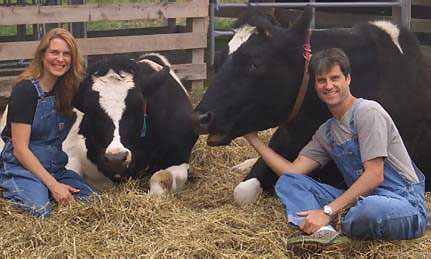March
2004
Walking
the Talk to a Compassionate World
By Gene Bauston
|
 |
Photo courtesy of Farm Sanctuary |
Those of us working to prevent animal cruelty and exploitation
currently face an impossible reality. Ethically, we cannot accept the
widespread torture being perpetrated every day, every second, by humans
against nonhumans. Ethically, we must stop this cruelty right now, but
sadly, despite our best efforts animal abuse continues. Thus, we are
forced to tolerate cruelty that is intolerable.
Animal rights advocates face a painful dilemma that can tempt us to
engage in desperate, sometimes violent, retaliation. But retaliation
usually invites more retaliation, which perpetuates violence and misunderstanding.
This approach has been rampant for thousands of years among human “civilizations,”
and it has wrought intense suffering for humans and nonhumans alike.
Those of us seeking to create a more compassionate society must distinguish
our behavior from that which has caused, and continues to cause, so
much pain.
If we treat others unkindly, especially if we threaten to harm others,
we invite a response to our actions, instead of a response to the animal
abuse we seek to end. If we victimize animal exploiters, their nonhuman
victims go unnoticed. We need to develop means to liberate all animals,
human and nonhuman, from animal exploitation. And this means rejecting
the cycle of violence and evolving beyond it.
The animal rights movement is rooted in compassion, and I believe that
most people, including those currently disconnected from animals, can
embrace this core value. Even persons engaged in animal cruelty can
ultimately adopt a humane, vegan lifestyle. Howard Lyman, a former cattle
rancher turned vegan activist, is a perfect example of what can happen.
Most of us, myself included, did not grow up vegan. We need to reach
out in a compassionate, non-judgmental way, and we need to create opportunities
for people to make humane choices. There are millions of individuals
who are likely to become vegan if approached in the right way.
It has been said that the only constant is change. It is up to us to
help shape and facilitate positive change with thoughtful and effective
education and communication strategies. Our movement is also becoming
more politically active, and we have started enacting groundbreaking
animal protection laws. For the first time in U.S. history, a factory
farming system was outlawed when millions of Floridians voted in November,
2002 to ban gestation crates (two-foot wide enclosures where breeding
pigs are confined most of their lives). A growing number of citizens
are learning about animal issues, and vegetarian food is becoming increasingly
accessible, even at fast food restaurants.
Public opinion polls consistently show widespread opposition to industrialized
farming and other institutionalized forms of animal cruelty. Yet, many
of the conditions that people find repugnant continue out of public
view, while consumers unwittingly subsidize and support them. When these
atrocities are exposed and consumers made to understand that their buying
habits are supporting this cruelty, many are moved to change, especially
when they see that humane, vegan alternatives are easily available.
Undercover investigations and open liberations are excellent examples
of nonviolent activism. In addition to modeling honesty and compassion,
these approaches effectively draw attention to animal abuse. By fixing
the public’s attention on cruelty, we can turn existing popular
sentiments into laws, policies, and consumer choices that prevent suffering.
Animal abuse is a people problem, and it will continue until people
question their assumptions and reevaluate their habits. Although most
people make choices that contribute to unnecessary cruelty every day,
it is the rare individual who wants to be cruel or unethical. Many act
in harmful ways out of habit or because they believe they must. But
when consumers recognize that certain behaviors, such as eating meat,
are harmful and not necessary, I believe most can and ultimately will
abandon bad habits.
None of us can change everything, but all of us can change some things.
We cannot control others, but we can control ourselves. It is our charge
to act with compassion, even in the face of cruelty and hostility, and
to consistently provide opportunities for people to make humane choices.
We should be heartened and empowered by even the smallest advances,
such as when a person stops eating veal or stops wearing fur. Small
steps lead to larger improvements. But each step forward enhances our
collective sensitivity and improves our understanding of others, which
leads ultimately to human and animal liberation.
Gene Bauston is President and co-founder of Farm Sanctuary.
To learn more, visit www.farmsanctuary.org
or call (607) 583-2225.
 |
|
|
 |

